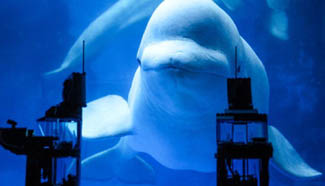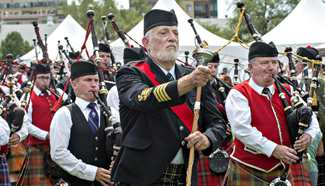? BEIJING, August 2 (Xinhuanet) -- The navies of China and Russia will hold their first ever joint landing drills during a large-scale naval exercise later this month in the Sea of Japan.
Experts say this reflects the deepened military cooperation between the two sides.
The two countries will conduct their largest joint Pacific exercise from August 20 to 28.
According to the plan, phase II of Joint Sea Exercise 2015 will be held in both the Sea of Japan and off the coast of Russian region of Primorsky - about 250 miles away from Japan.
Military commentator Song Xiaojun says the location of the exercise is of strategic significance.
"The situation in the Sea of Japan has become volatile especially after US President Barack Obama announced the so-called Return to Asia plan three years ago and enhanced assistance to Japan. Taking into account Japan's latest move to lift the ban on the right to collective defense that strengthens the Japan-US alliance and Russia-US confrontation in East Europe, tensions in the sea area may escalate. Meanwhile, the area neighbors Russia's sparsely-populated Far East and China's northeast that is undergoing rejuvenation, so both China and Russia want to enhance defense there."
Joint exercises between the two navies have become regular in recent years as part of the bilateral efforts for closer ties.
Last year saw the largest series of exercises that involved 14 surface ships, two submarines, aviation assets and special operation forces from the two sides.
The Pacific drills follow the first ever joint Chinese-Russian exercise in the Mediterranean Sea during the Joint Sea Exercise 2015 phase I this May.
The smaller exercise involved three warships from China and six from Russia and featured supply and escort drills.
Russian Pacific Fleet spokesman Roman Martov earlier said that the maneuvers this time will for the first time involve a joint amphibious assault drill with the participation of carrier-based aircraft.
Navy expert Yin Zhuo says the larger drills result from the higher military cooperation level between the two sides.
"The joint drills show that China and Russia are trying to deepen their military cooperation. Generally speaking, more specific joint trainings bring more difficulties. Units from the two sides will operate under unified tactics, with their weapons to be regrouped and warships reorganized. It requires a smooth data connection and a unified command system. And only with that, could joint anti-submarine and landing exercises be conducted."
The drills will involve from both sides about 20 warships and support vessels of various class.
The final planning conference for the drills has ended in Vladivostok with the signing of an exercise protocol.
During the Chinese fleet's visit to Vladivostok port, cultural programs and sports competitions will also be held between the two navies.










